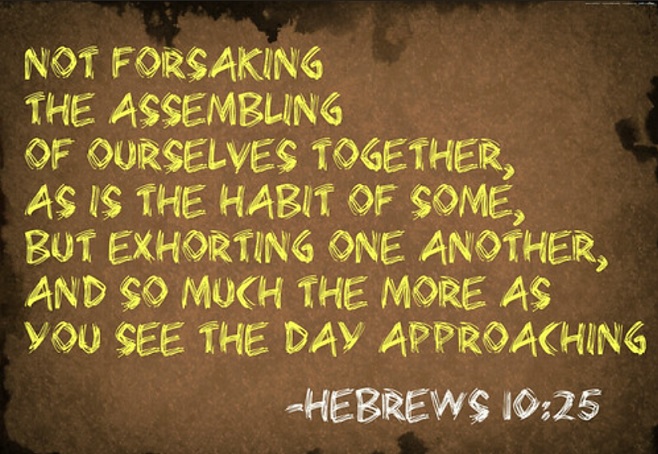“Go therefore and make disciples of all the nations…teaching them to observe all that I commanded you; and lo, I am with you always, even to the end of the age” (Matthew 28:19-20, NASB).
——————–
Contents:
1) Postponed Prophecies (Frank Himmel)
2) When Christians Assemble (Bill Crews)
3) Power of Godliness (video sermon, Tom Edwards)
4) News & Notes
——————–

-1-
Postponed Prophecies
Frank Himmel
Premillennialists tell us the kingdom of Old Testament prophecy is yet future. They say Jesus came to reign as the Messiah but the Jews rejected Him. He therefore established the church as a last-minute substitute; they often call it a “parenthesis.” It will continue until Jesus comes again, at which time He will establish His kingdom. Thus, the kingdom was postponed.
The Bible teaches no such thing. In fact, this theory contradicts the Scriptures in at least four ways.
First, predictions with a time element cannot be postponed. If I predict that a certain team will win the Super Bowl, but I do not say when, then whenever they win my prediction will be fulfilled. But if I specify 2025 as the year, and my team does not win it until 2030, I cannot say my prediction was postponed; I must admit that it was false.
So it is with Bible prophecy. When Daniel put a time element on the establishment of God’s kingdom—in the days of the Roman kings (Daniel 2:44)—that eliminated every other time, before and after. Either his prediction came to pass as stated, or he must be rejected as a false prophet (Deuteronomy 18:22).
Premillennialists sometimes try to get around this obvious point by saying Daniel was referring to a “revived” Roman Empire. Not so. The four parts of Nebuchadnezzar’s image were four successive world empires. Besides, if Daniel’s prophecy refers to a revived Roman Empire, why did Jesus try to establish the kingdom during the historic Roman Empire? Did God’s Son not understand the prophecy He was trying to fulfill?
Second, the Bible tells us that the church was part of God’s eternal plan, not an afterthought. God’s wisdom manifested in the church “was in accordance with the eternal purpose which He carried out in Christ Jesus our Lord” (Ephesians 3:10-11).
Third, God knew beforehand that His Son would be rejected. Isaiah foretold that the Christ would be “despised and rejected of men” (53:3). Earlier, the Psalmist referred to Him as “the stone which the builders rejected” (118:22). One of Peter’s points in his Pentecost sermon was that Jesus was “delivered up by the predetermined plan and foreknowledge of God” (Acts 2:23).
Did that rejection of Jesus require God to postpone His kingdom plans? Not at all. Consider Psalm 2. In verses 1-3 the kings and nations are taking their stand against God’s anointed. (The New Testament says this refers to Herod, Pilate, the Gentiles, and the Jews’ opposition to Jesus [Acts 4:25-28]). How does that affect God and His plans? “He who sits in the heavens laughs, the Lord scoffs at them. Then He will speak to them in His anger and terrify them in His fury, saying, ‘But as for Me, I have installed My King upon Zion, My holy mountain’” (vv. 4-6). Next is the Anointed’s testimony of God’s decree: “He said to Me, ‘You are My Son, today I have begotten You.’” That refers to Jesus’ resurrection (Acts 13:33), following which He ascended into heaven where He was given the nations to rule with a rod of iron (vv. 6-9; Revelation 2:26-27).
The Jews’ rejection of Jesus was not an obstacle to God’s plan, it was a key element in its success! “For those who live in Jerusalem, and their rulers, recognizing neither Him nor the utterances of the prophets which are read every Sabbath, fulfilled these by condemning Him” (Acts 13:27).
Fourth, the Bible teaches that the kingdom is now in existence. “For He delivered us from the domain of darkness, and transferred us to the kingdom of His beloved Son” (Colossians 1:13). “I John, your brother and fellow-partaker in the tribulation and kingdom and perseverance which are in Jesus . . .” (Revelation 1:9). The kingdom consists of men and women everywhere who are purchased by Jesus’ blood (Revelation 5:9-10; 1:5-6; cf. Acts 20:28). Many other New Testament passages speak of Jesus sitting on God’s throne and reigning (Revelation 3:21; Acts 2:34; 1 Corinthians 15:24-26; Hebrews 1:8).
God’s prophetic word has come to pass. Jesus now reigns in a kingdom “not of this world” (John 18:36). Have you been born again, born of water and the Spirit, to become a citizen in that kingdom (John 3:3-5)?
— Via Pathlights, February 6, 2022
——————–
When Jesus ascended, “He came up to the Ancient of Days [the Father]…” And “was given dominion, Glory and a kingdom. That all the peoples, nations and men of every language Might serve Him…” (Daniel 7:13-14, NASB, emphasis mine, cf. Acts 1:9-11). Jesus received the kingdom!
——————–

-2-
When Christians Assemble
Bill Crews
EDITOR’S NOTE [Wayne Goff]: Bill Crews’ sermon last Sunday morning contained the material published below from notes I took from his sermon. Faithful attendance has become a great problem in the current pandemic, but faithful attendance has been a recurring issue throughout the existence of the Lord’s church. The five points Bill gave in his lesson are fundamental truths, but profound in their meaning and application. The points are published here for our members and Christians everywhere to consider! Until we improve our attendance, the church will continue to suffer here and everywhere! {You can hear this sermon on YouTube or our web site: www.roanridge.org}
What do the following Scriptures have in common? Acts 2:42, Acts 11:26, Acts 20:7, 1 Corinthians 16:2, 1 Corinthians 11:18-34 (the phrase “coming together” is found five times in this chapter), Hebrews 10:25 (note that “exhorting one another” is joined with “assembling together.” You have probably noticed that every single passage had to do with gathering together. Here are five points that are proven in the given Scriptures:
1. Christians are to assemble, or come together. Acts 2:42 teaches us that the first church had to learn from the apostles what to do in the church and as the church. Worship, honoring Jesus, and edifying one another are some of the reasons for assembling. “Fellowship” (joint participation) is practiced in the five acts of worship: singing, praying, giving, Lord’s Supper, and teaching or preaching.
2. Christians are to do so for specific reasons. Acts 11:26 says “… And it came to pass, that even for a whole year they were gathered together with the church, and taught much people, and that the disciples were called Christians first in Antioch.” Paul could do the preaching. Barnabas could do the exhorting. Barnabas is commended as a great “exhorter,” and we need more of that today. It involves appealing, reasoning, and encouraging people. Hebrews 10:25 tells us to exhort one another when we assemble. If you don’t assemble, then you cannot exhort!
3. Christians are to conduct themselves properly in these assemblies. We must assemble willingly, cheerfully, not grudgingly or of necessity (see 2 Cor. 9:6-7). What the Bible says we must do in giving, we must also do in singing, praying, listening, learning and communing. Think of the lengths and efforts we make to attend a sporting event. We should expend even greater effort to assemble with the saints.
4. Christians are to prepare themselves for the assemblies. We are to prepare ourselves for Bible classes and preaching and conduct ourselves properly. We should look forward to each and every assembly. We are to prepare our bodies with proper rest. We are to prepare our minds with meditation and think upon spiritual things. Be sure that you are “on praying terms with God,” which means you conduct yourselves as you profess so that God will hear your prayers. See Proverbs 23:7; Psalm 66:18.
5. Christians should accomplish the specific reasons for which they assemble. How much do we derive from the Bible classes and sermons? You get as much out of worship as you prepare yourself to get. Getting ready for church involves much more than just getting dressed up. The most important things to me in life are spiritual! Jesus Christ was crucified by those He loved even while they hated and despised Him! Can you not find in your heart the love for God for what He has done for you?!
— Via Roanridge Reader, Volume 37, Issue 5, Page 3
——————–
A Song of Ascents, of David. I was glad when they said to me, “Let us go to the house of the LORD” (Psalm 122:1, NASB).
——————-
-3-
Power of Godliness
Tom Edwards
For the video sermon with the above title, just click on the following link:
https://thomastedwards.com/wordpress/Power_of_Godliness.mp4
——————-
-4-
News & Notes
Folks to continue praying for:
Jim Lively had some bad falls recently, which resulted in a deep indent in a wall, bruises, sloughed off skin on his leg, and hurting all over.
Let us also be remembering in prayer Rick Cuthbertson, Ronnie Davis, A.J. Joyner, Tammy Griffey, Deborah Medlock, Rex Hadley, Lois Fletcher, Vivian Foster, Danielle Bartlett, Kayla Williams, and Kim Rowell.
——————–
The Steps That Lead to Eternal Salvation
1) Hear the gospel — for that is how faith comes (Rom. 10:17; John 20:30-31).
2) Believe in the deity of Jesus Christ, the Son of God (John 8:24; John 3:18).
3) Repent of sins. For every accountable person has sinned (Romans 3:23; Romans 3:10), which causes one to be spiritually dead (Ephesians 2:1) and separated from God (Isaiah 59:1-2; Romans 6:23). Therefore, repentance of sin is necessary (Luke 13:5; Acts 17:30). For whether the sin seems great or small, there will still be the same penalty for either (Matt. 12:36-37; 2 Cor. 5:10) — and even for a lie (Rev. 21:8).
4) Confess faith in Christ (Rom. 10:9-10; Acts 8:36-38).
5) Be baptized in water for the remission of sins (Mark 16:16; Acts 2:38; 22:16; 1 Pet. 3:21). This is the final step that puts one into Christ (Gal. 3:26-27). For from that baptism, one is then raised as a new creature (2 Cor. 5:17), having all sins forgiven and beginning a new life as a Christian (Rom. 6:3-4). For the one being baptized does so “through faith in the working of God” (Col. 2:12). In other words, believing that God will keep His word and forgive after one submits to these necessary steps. And now as a Christian, we then need to…
6) Continue in the faith by living for the Lord; for, if not, salvation can be lost (Matt. 24:13; Heb. 10:36-39; Rev. 2:10; 2 Pet. 2:20-22).
——————–
Tebeau Street
CHURCH OF CHRIST
1402 Tebeau Street, Waycross, GA 31501
Sunday: 9 a.m. Bible Class and 10 a.m. Worship Service.
We also have a Song Service at 5 p.m. for every first Sunday of the month.
evangelist/editor: Tom Edwards (912) 281-9917
Tom@ThomasTEdwards.com
https://thomastedwards.com/go/all.htm (This is a link to the older version of the Gospel Observer website, but with bulletins going back to March 4, 1990.)